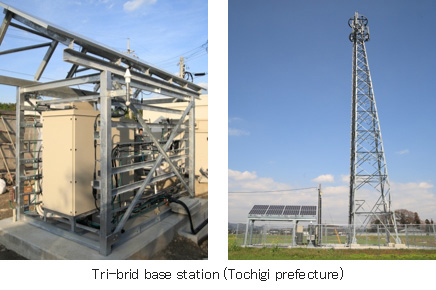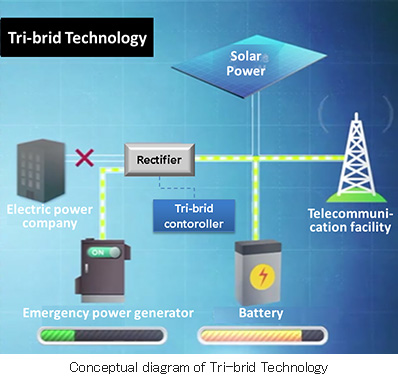- KDDI HOME
- Corporate Information
- News Releases
- 2015
- KDDI tackles global warming with international tri-brid base stations
KDDI tackles global warming with international tri-brid base stations
―Verifying the results of introducing tri-brid base stations in Indonesia through a METI program―
- KDDI CORPORATION
January 14,2015
In December 2009, KDDI constructed and began operation of Japan's first "tri-brid" base station, which is a mobile phone base station that operates in response to the weather conditions and time of day by making efficient use of three types of electric power, - standard commercial electric power, solar power generation, and rechargeable batteries. Tri-brid base stations have been found to reduce annual CO2 emissions by up to 30%, compared to base stations that utilize only commercial electric power. In the future, KDDI plans to deploy Tri-brid base stations internationally as a measure to combat global warming.
Japan's Ministry of Economy, Trade and Industry, which solicits proposals for joint crediting mechanisms (referred to below as "JCM")* through the Dissemination and Promotion of Global Warming Countermeasure Technology Program each year, recently adopted KDDI's proposed feasibility study for a JCM project based on the introduction of Tri-brid technology into mobile phone base stations in the Republic of Indonesia (referred to below as "Indonesia").
Through this study in Indonesia, KDDI will investigate the communications environment and electric power situation, quantify the reductions in greenhouse gas emissions through the introduction of Tri-brid base stations, and present guidelines on how to evaluate the emission reduction results and the feasibility of introducing this technology. KDDI intends to utilize the study results in its efforts to reduce greenhouse gas emissions through the implementation of Tri-brid base stations in Indonesia.
In November 2014, relevant personnel involved in communications and installation in Indonesia participated in seminars and visited tri-brid base stations to deepen their understanding of the technology.
Moving forward, KDDI will continue to embrace its important environmental responsibility as a global corporation, through efforts that make use of the latest technology and expertise.
About KDDI
KDDI Corporation is a leading Japanese telecommunications and ICT solution provider with 100 offices in 28 countries around the world and a Global Fortune 300 company. Serving 40 million domestic mobile subscribers and over 2,000 large enterprises, KDDI provides a diverse portfolio consisting of managed networks, data centers, cloud, security and system integration. As a global ICT provider, KDDI design and build highly reliable unified infrastructure for the world's leading financial, media, manufacturing and professional IT services. With 17 subsidiary divisions in data management technology and dedicated R&D facilities, KDDI enables its clients to reach their innovative potential.
![]() http://global.kddi.com
http://global.kddi.com
<Reference 1: Tri-brid base stations>
Tri-brid base stations are mobile phone base stations that operate in response to the weather conditions and time of day by making efficient use of standard commercial electric power, solar panels that generate power during the day, and rechargeable batteries that can provide power at night. It is expected that Tri-brid base stations can reduce CO2 emissions by up to 30%, compared to base stations that utilize only commercial electric power. KDDI constructed the first Tri-brid base station in Japan in December 2009, and expanded operations to 100 locations nationwide at the end of March 2014.


<Reference 2: Dissemination and Promotion of Global Warming Countermeasure Technology Program>
In an effort to reduce greenhouse gas emissions on a global scale and develop measures to combat global warming, the government of Japan supports the introduction of low-carbon technology and products in emerging nations. In addition, the development of JCM supports the accelerated dissemination of excellent low-carbon technology, products, systems, services and infrastructure, while contributing to sustainable development in developing countries. Furthermore, the improved ability to measure, report, verify, and evaluate Japan's contribution to the reduction of greenhouse gases aims to assist in the achievement of Japan's greenhouse gas emission reduction targets.
The Dissemination and Promotion of Global Warming Countermeasure Technology Program aims to clarify the usefulness of JCM and Japan's low-carbon technology and products, through activities such as making policy recommendations to partner countries that may be appropriate candidates, or offering business scheme proposals aimed at implementing low-carbon technology and products.
Further information: ![]() Dissemination and Promotion of Global Warming Countermeasure Technology Program (NEDO)
Dissemination and Promotion of Global Warming Countermeasure Technology Program (NEDO)